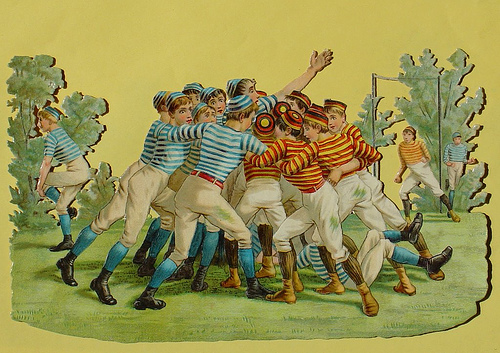The History of Rugby Union
The history of rugby union follows from various football games played long before the 19th century, but it was not until the middle of that century that rules were formulated and codified. The game’s origins lie firmly in England, in the town of Rubgy in Warwickshire, and are tied to various forms of “football” games played by pupils of the Rugby public school.
The origin of rugby is reputed to be an incident during a game of football at Rugby School, Rugby, in 1823 when William Webb-Ellis picked up the ball and ran with it. Although this tale is likely to be apocryphal, the trophy played for every four years at the Rugby World Cup is named after him.
Significant events in the early development of rugby were the production of the first set of written laws for the game of football in 1845 at Rugby School (by three pupils of the school), the development of a Football Association which first attempted to codify a complete set of rules fo the game, the Blackheath Club's decision to leave the Football Association in 1863 in order to follow its own set of rules, the nucleus of the future Rugby Union rules, and the formation of the Rugby Football Union in 1871. The code was originally known simply as "rugby football"; it was not until after a schism in 1895, which resulted in the separate code of rugby league, that the name "rugby union" came to be used for the game itself.
Rugby football has strong claims to the world's first and oldest "football club": the Guy's Hospital Football Club, formed in London in 1843, by old boys from Rugby School. Around the anglosphere, a number of other clubs formed to play games based on the Rugby School rules. One of these, Dublin University Football Club, founded in 1854, has arguably become the world's oldest surviving football club in any code. The Blackheath Rugby Club, in London, founded in 1858 is the oldest surviving non-university/school rugby club. Cheltenham College 1844, Sherborne School 1846 and Durham School 1850 are the oldest documented school's clubs. Francis Crombie and Alexander Crombie introduced rugby into Scotland via Durham School in 1854.
On 4 December 1870, Edwin Ash of Richmond and Benjamin Burns of Blackheath published a letter in The Times suggesting that "those who play the rugby-type game should meet to form a code of practice as various clubs play to rules which differ from others, which makes the game difficult to play." On 26 January 1871 a meeting attended by representatives from 21 clubs was held in London at the Pall Mall Restaurant.
The 21 clubs present at the meeting were: Blackheath (represented by Burns and Frederick Stokes the latter becoming the first captain of England), Richmond, Ravenscourt Park, West Kent, Marlborough Nomads, Wimbledon Hornets, Gipsies, Civil Service, Law Club, Wellington College, Guy’s Hospital, Flamingoes, Clapham Rovers, Harlequin F.C., King's College, St Paul's, Queen’s House, Lausanne, Addison, Mohicans, and Belsize Park. The one notable omission was the Wasps. According to one version, a Wasps' representative was sent to attend the meeting, but owing to a misunderstanding, was sent to the wrong venue at the wrong time on the wrong day; another version is that he went to a venue of the same name where, after consuming a number of drinks, he realised his mistake but was too drunk to make his way to the correct venue.
Historic Rugby, Aussie-style: the Perth RFC
As a result of this meeting the Rugby Football Union (RFU) was founded. Algernon Rutter was elected as the first president of the RFU and Edwin Ash was elected as treasurer. Three lawyers who were Rugby School alumni (Rutter, Holmes and L.J. Maton) drew up the first laws of the game which were approved in June 1871.
Rugby union was famously an amateur sport until the IRB declared the game 'open' in 1995, removing restrictions on payments to players.
This article is licensed under the GNU Free Documentation License. It uses material from the Wikipedia article "Rugy Union " at http://en.wikipedia.org/wiki/History_of_rugby_union





